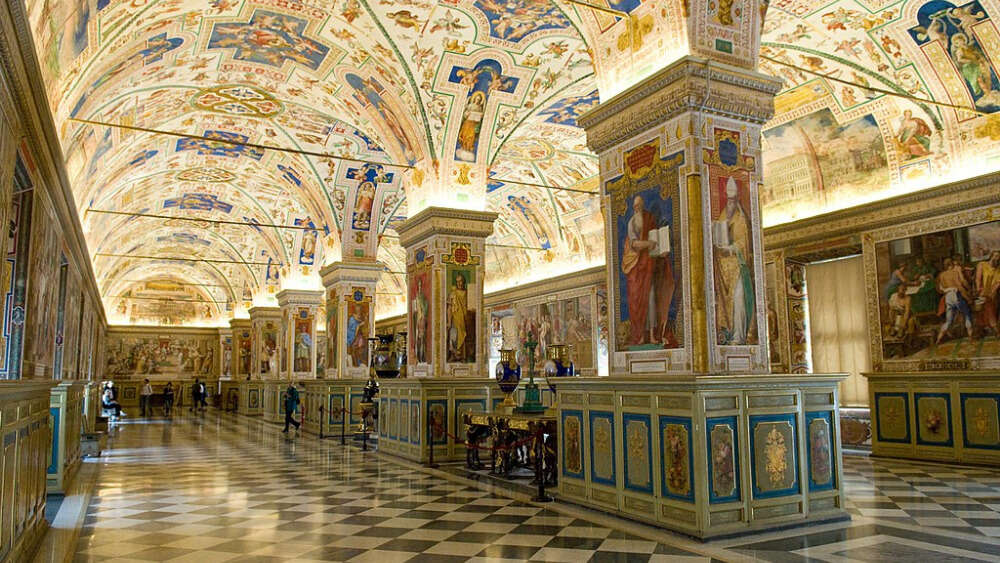'The world needs new maps' says Pope Francis as Vatican opens new contemporary art gallery
“The Church must bear witness to the importance of beauty and culture”
The Vatican’s Apostolic Library is a space usually only accessible by researchers. Now, its exhibition hall has become a contemporary art exhibition open to the public.
“Beauty is not the fleeting illusion of an appearance or an ornament: it springs instead from the root of goodness, truth and justice, which are its synonyms,” Pope Francis said at the hall’s inauguration last week.
“But we must not neglect to think and speak of beauty, because the human heart does not only need bread, it does not only need that which guarantees its immediate survival: it also needs culture, that which touches the soul, which brings the human being closer to his or her profound dignity. This is why the Church must bear witness to the importance of beauty and culture, in dialogue with the particular thirst for the infinite that defines the human being.”
We need a new beauty, which is no longer the usual reflection of the power of a few, but the courageous mosaic of the diversity of all.
The inaugural exhibition showcases the work of Pietro Ruffo and is called Tutti. Umanità in cammino or Everyone: Humanity on Its Way. It was selected to be a reflection on Francis’ encyclical Fratelli tutti – Brothers All.
It features historical artefacts from the library, including charts and a 6-metre-long 17th century map of the Nile made by Evliya Çelebi, “in dialogue” with new maps that the artist has created.
Don Giacomo Cardinali, who oversees the new space, said the exhibition explores “non-geographical cartography”. These include “allegorical, theological, satirical, and sentimental maps, as well as maps of desire and of protest, of humanity’s dreams and desperation.”
“Throughout the history of humanity, people have used the representative power of the map not only to describe the objectivity of the Earth, but also our own interiority, ideals, journeys, discoveries, and convictions,” he said.
Pope Francis viewed the exhibition and referred to it in his inauguration speech.
“I appreciate this challenge of creating a dialogue. Life is the art of encounter. Cultures ail when they become self-referential, when they lose their curiosity and their openness to the other. When they exclude instead of integrating. What advantage do we have in making ourselves guardians of borders, instead of guardians of our brothers and sisters? The question that God repeats to us is: “Where is your brother?” (cf. Gen 4:9).”
“Let us dream together of “new maps”.
Francis told his audience that “the world needs new maps”.
“In this epochal change that has been accelerated by the pandemic, humanity needs new maps to discover the meaning of fraternity, social friendship and the common good. The logic of closed blocks is barren and full of misunderstandings. We need a new beauty, which is no longer the usual reflection of the power of a few, but the courageous mosaic of the diversity of all. It must not be the mirror of a despotic anthropocentrism, but a new canticle of creatures, where an integral ecology is made tangible,” Francis said.
Francis has consistently worked to see Vatican buildings become more accessible to the public, making the papal summer house in Castel Gandolfo into a museum, hosting children’s summer camps for Vatican staff’s families, and converting the Palazzo Migliori into a “palace for the poor“.
“From the beginning of my pontificate, I have called the Church to make herself an “outbound Church” and a protagonist of the culture of encounter. The same thing applies to the library. It serves the Church all the better if, in addition to preserving the past, it dares to be a frontier of the present and the future. I know that you are aware of this: that our responsibility is to keep roots and memory alive, always looking towards the flowers and the fruits,” Francis said.
The Pope said he was counting on the Apostolic Library to translate “the deposit of Christianity” into the languages of today and tomorrow.
“Let us dream together of “new maps”. I am thinking in particular of the need to move from analogue to digital, increasingly to translate our heritage into new languages. It is a historic challenge that we must face with wisdom and boldness,” he said.
The papal leader also took time to encourage the library’s staff, telling them even if their work is unseen by most people, it plays a supporting role.
“At times, we think of the value of the things or the people that can be seen, but there are many, many hidden people who lead forth life, the family, the world, society, everything, culture… Thank you for this work, thank you. And I ask the Lord to bless you, you and your families.”
Email This Story
Why not send this to a friend?



